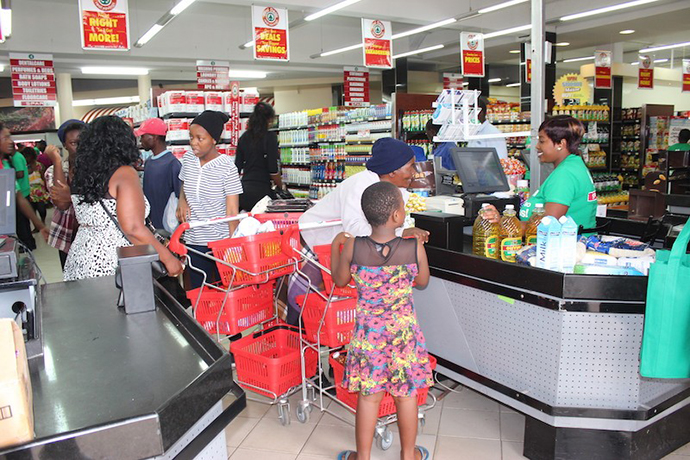
This comes as Mnangagwa’s government this week ordered bakers to reduce an 11 percent price increase on bread.
Yesterday most supermarkets were deserted as the usual brisk business traditionally recorded during the festive season was low as long-suffering consumers shirked at steep prices on basic goods.
The sudden price increases came as foreign currency rates tumbled on the black market mainly due to low demand and the increase in inflows from people coming from the Diaspora.
Yesterday President Confederation of Zimbabwe Retailers (CZR), Denford Mutashu, was at pains to explain the price increases.
“People are buying for Christmas and equally retailers are adequately stocked and there are no shortages in terms of basic commodities.
“Yes, at some point we had affordability issues but government through ministry of Trade engaged business and we are seeing prices coming down.
“We will see prices continue to go further down even after Christmas and rates on the parallel market tumbling due to reduced demand since most companies have shutdown,” Mutashu told the Daily News.
“We expect demand of foreign currency to start picking up during the second week of January but we advise government, by that time, should have sourced as much foreign currency as possible so that when the demand starts to pick up they won’t be a shortage of foreign currency that will again cause prices to spiral out of control.
“A lot of inflows have increased from diaspora, a lot of people coming from diaspora brought in their hard cash which has come into the formal system and that has also helped,” Mutashu added.
However, the prices that were displayed in the shops contrasted Mutashu.
Despite huge red signs announcing the arrival of Christmas in most shops, many of the stores were quiet, with many shoppers expressing shock at the latest price hikes.
A kilogramme of frozen chicken cuts was averaging $ 9 while 2kgs and full chicken were priced at $19, 60 and $31, respectively.
Economy stewing beef was averaging $ 9 per kg while dried kapenta (matemba) – depending on the brand were being sold at between $11-$18 per 2kgs – from an average price of about $8 that was obtaining last week.
A 2kg packet of plain flour, which was trading at $1,70 breached the $2 mark while the same quantity of self-raising flour which was between $1,89 and $1,99 was priced at between $2, 10 and $2,30 in various retail outlets.
A 2kg packet of ordinary rice which cost $2,85 by the end of October is now $3, 29 while the superior qualities such as basmati and jasmine jumped from around $4 up to as much as high as $11.
Two litres of cooking oil were trading at between $4, 35 and $5, 10.
It was not just the foodstuffs only that had prices increased but also items such as sanitary wear products which sold for less than a $1 last month have risen to over $2.
Former finance minister Tendai Biti bemoaned the high prices.
“The wheels are coming off, it’s back to the 2008 hyperinflationary era.I haven’t seen anything that is inspiring.
“We have to pray that we have elections that are free and fair and hope that Zimbabweans are wise enough to elect a new government altogether. The change which we recently celebrated was only just a haircut, the person remains the same,” said Biti, in remarks aimed at Mnangagwa and his government.
The Confederation of Zimbabwe Industries (CZI) president, Sifelani Jabangwe, recently told the Daily News that local manufacturers had not hiked prices that much – in remarks widely seen as pointing fingers at the retailers.
He said the country’s largest industrial representative group was of the view that prices of imported goods were the ones that have significantly gone up with locally manufactured products remaining with a 20 percent increase margin from comparative prices last year.
“For the imported goods, it’s mainly driven by the shortage of currency. However, with locally produced good, you should look at it differently.
“Meat, on the other hand, is a different story. We are also trying to understand if the price has been affected by the new regulations for farmers.
“It could also be the issue whereby some farmers are now asking for half cash payment and half electronic payment, which could be driving up prices,” said Jabangwe.
On Tuesday Industry minister Mike Bimha briefly held a meeting with meat producers where he had intended to discuss the sharp meat prices.
The meeting followed another one Bimha had held with bakers and other industry players on Monday to look at the 10 percent bread price hike.
Bakers were forced to reduce the price of a loaf of bread to the “old price” of $0, 90 and $1.
Bimha said government was also working to address the issue of price increases across the board.
Zimbabwe has been recording price hikes of several commodities with indications that the Christmas holiday will be gloomy for many families.
Economic analysts are predicting doom and gloom for the consumer unless the authorities adopt stern measures to curb overpricing.
There are fears that Zimbabwe could easily slip into another hyperinflationary era reminiscent of the 2007/09 period when soaring inflation obliterated the Zimbabwe’s dollar along with its pensions and savings.
To escape hyperinflation which had topped out at 500 billion percent, the country was forced to adopt the United States dollar in 2009, along with Britain’s pound and the South African rand.
But the relative financial stability of the last eight years has unravelled in the last few months as acute foreign exchange shortages have led to sharp price increases. DailyNews






